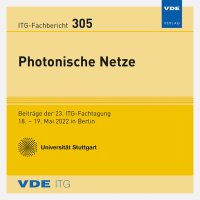Experimental validation of exact component parameter agnostic QoT estimation using spectral data-driven LSTM over a 265.2 km SSMF link
Conference: Photonische Netze - 23. ITG-Fachtagung
05/18/2022 - 05/19/2022 at Berlin
Proceedings: ITG-Fb. 305: Photonische Netze
Pages: 5Language: englishTyp: PDF
Authors:
Kruse, Lars E.; Pachnicke, Stephan (Chair of Communications Christian-Albrechts-University of Kiel Kiel, Germany)
Abstract:
The ever-growing demand for capacity necessitates optical networks to undergo enormous changes which will lead to the increase in complexity of future networks. Since the beginning of optical transmission networks, the insurance of services to provide the best possible connection for the customer (Quality of service, QoS) has always been an important topic for network providers. Traditionally, networks were conservative with high margins. However, high margins lead to wasted capacity. Due to this, the optimization of new and established connections is of increasing importance. Quality of transmission (QoT) estimation enables network operators to respond proactively to performance degradations and to lower the design margins. Machine learning-based QoT estimation has received significant attention from the community, since it can become an alternative to numerical and analytical approaches, which suffer from high computational complexity or inaccuracy, respectively. In this paper, we extend our work by validating the proposed QoT estimation tool based on a spectral data-driven LSTM/NN-based machine learning algorithm by testing the algorithm, trained with simulation data, on an experimental dataset that contains data from a DP-QPSK or DP-16-QAM modulated WDM transmission over 3 spans of 88.4 km SSMF with different channel assignments of 9 channels in a 37.5 and 50 GHz ITU-grid operating at 32 Gbaud. The estimator shows an MAE of 0.507 dB and an R2-score of 0.897.


